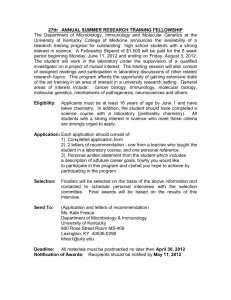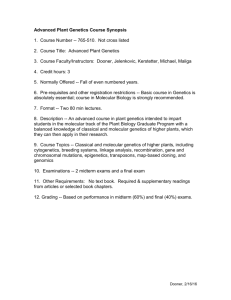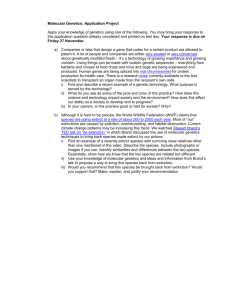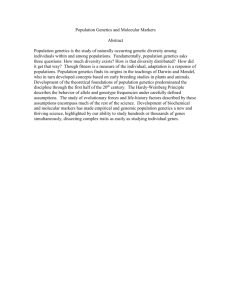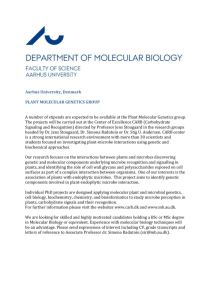Microbiology and Molecular Genetics - University of California, Irvine
advertisement
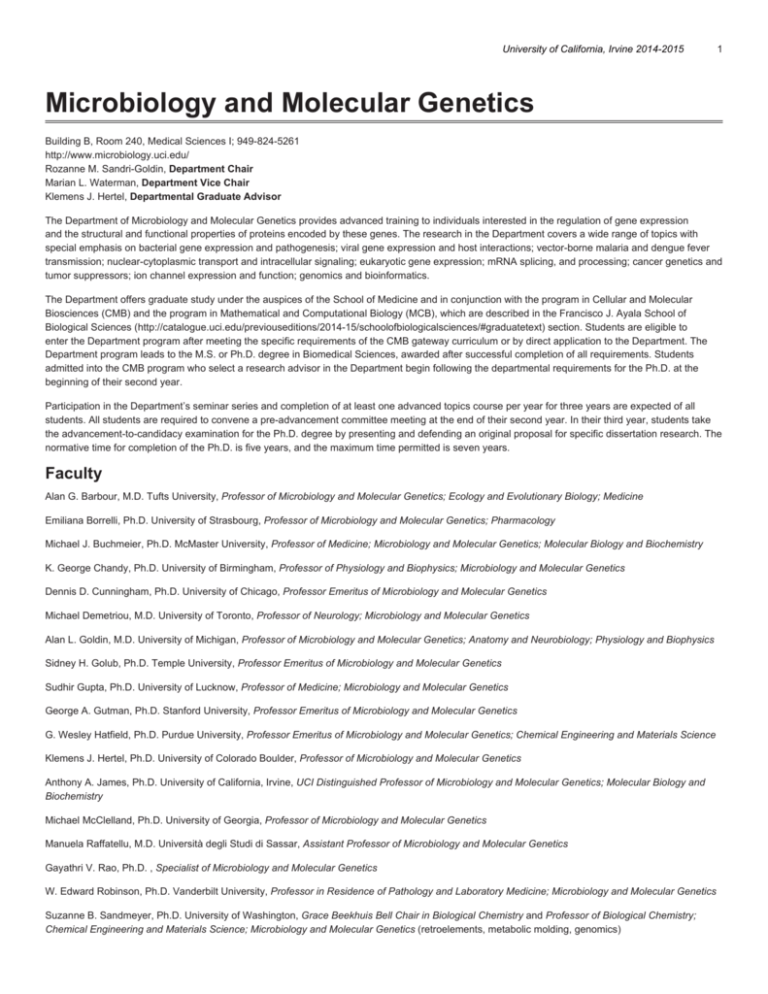
University of California, Irvine 2014-2015 1 Microbiology and Molecular Genetics Building B, Room 240, Medical Sciences I; 949-824-5261 http://www.microbiology.uci.edu/ Rozanne M. Sandri-Goldin, Department Chair Marian L. Waterman, Department Vice Chair Klemens J. Hertel, Departmental Graduate Advisor The Department of Microbiology and Molecular Genetics provides advanced training to individuals interested in the regulation of gene expression and the structural and functional properties of proteins encoded by these genes. The research in the Department covers a wide range of topics with special emphasis on bacterial gene expression and pathogenesis; viral gene expression and host interactions; vector-borne malaria and dengue fever transmission; nuclear-cytoplasmic transport and intracellular signaling; eukaryotic gene expression; mRNA splicing, and processing; cancer genetics and tumor suppressors; ion channel expression and function; genomics and bioinformatics. The Department offers graduate study under the auspices of the School of Medicine and in conjunction with the program in Cellular and Molecular Biosciences (CMB) and the program in Mathematical and Computational Biology (MCB), which are described in the Francisco J. Ayala School of Biological Sciences (http://catalogue.uci.edu/previouseditions/2014-15/schoolofbiologicalsciences/#graduatetext) section. Students are eligible to enter the Department program after meeting the specific requirements of the CMB gateway curriculum or by direct application to the Department. The Department program leads to the M.S. or Ph.D. degree in Biomedical Sciences, awarded after successful completion of all requirements. Students admitted into the CMB program who select a research advisor in the Department begin following the departmental requirements for the Ph.D. at the beginning of their second year. Participation in the Department’s seminar series and completion of at least one advanced topics course per year for three years are expected of all students. All students are required to convene a pre-advancement committee meeting at the end of their second year. In their third year, students take the advancement-to-candidacy examination for the Ph.D. degree by presenting and defending an original proposal for specific dissertation research. The normative time for completion of the Ph.D. is five years, and the maximum time permitted is seven years. Faculty Alan G. Barbour, M.D. Tufts University, Professor of Microbiology and Molecular Genetics; Ecology and Evolutionary Biology; Medicine Emiliana Borrelli, Ph.D. University of Strasbourg, Professor of Microbiology and Molecular Genetics; Pharmacology Michael J. Buchmeier, Ph.D. McMaster University, Professor of Medicine; Microbiology and Molecular Genetics; Molecular Biology and Biochemistry K. George Chandy, Ph.D. University of Birmingham, Professor of Physiology and Biophysics; Microbiology and Molecular Genetics Dennis D. Cunningham, Ph.D. University of Chicago, Professor Emeritus of Microbiology and Molecular Genetics Michael Demetriou, M.D. University of Toronto, Professor of Neurology; Microbiology and Molecular Genetics Alan L. Goldin, M.D. University of Michigan, Professor of Microbiology and Molecular Genetics; Anatomy and Neurobiology; Physiology and Biophysics Sidney H. Golub, Ph.D. Temple University, Professor Emeritus of Microbiology and Molecular Genetics Sudhir Gupta, Ph.D. University of Lucknow, Professor of Medicine; Microbiology and Molecular Genetics George A. Gutman, Ph.D. Stanford University, Professor Emeritus of Microbiology and Molecular Genetics G. Wesley Hatfield, Ph.D. Purdue University, Professor Emeritus of Microbiology and Molecular Genetics; Chemical Engineering and Materials Science Klemens J. Hertel, Ph.D. University of Colorado Boulder, Professor of Microbiology and Molecular Genetics Anthony A. James, Ph.D. University of California, Irvine, UCI Distinguished Professor of Microbiology and Molecular Genetics; Molecular Biology and Biochemistry Michael McClelland, Ph.D. University of Georgia, Professor of Microbiology and Molecular Genetics Manuela Raffatellu, M.D. Università degli Studi di Sassar, Assistant Professor of Microbiology and Molecular Genetics Gayathri V. Rao, Ph.D. , Specialist of Microbiology and Molecular Genetics W. Edward Robinson, Ph.D. Vanderbilt University, Professor in Residence of Pathology and Laboratory Medicine; Microbiology and Molecular Genetics Suzanne B. Sandmeyer, Ph.D. University of Washington, Grace Beekhuis Bell Chair in Biological Chemistry and Professor of Biological Chemistry; Chemical Engineering and Materials Science; Microbiology and Molecular Genetics (retroelements, metabolic molding, genomics) 2 Microbiology and Molecular Genetics Rozanne M. Sandri-Goldin, Ph.D. Johns Hopkins University, Professor of Microbiology and Molecular Genetics Paolo Sassone-Corsi, Ph.D. University of Naples Federico II, Donald Bren Professor and Professor of Biological Chemistry; Microbiology and Molecular Genetics; Pharmaceutical Sciences Bert L. Semler, Ph.D. University of California, San Diego, Professor of Microbiology and Molecular Genetics Yongsheng Shi, Ph.D. Syracuse University, Assistant Professor of Microbiology and Molecular Genetics Eric J. Stanbridge, Ph.D. Stanford University, Professor Emeritus of Microbiology and Molecular Genetics Paul S. Sypherd, Ph.D. Yale University, Professor Emeritus of Microbiology and Molecular Genetics Ming Tan, M.D. Johns Hopkins University, Professor of Microbiology and Molecular Genetics; Medicine Marian L. Waterman, Ph.D. University of California, San Diego, Professor of Microbiology and Molecular Genetics Xiangmin Xu, Ph.D. Vanderbilt University, Assistant Professor of Anatomy and Neurobiology; Biomedical Engineering; Electrical Engineering and Computer Science; Microbiology and Molecular Genetics (local cortical circuits) Courses MIC BIO 200R. Research in Developmental & Cell Biology for First-year Students. 2-12 Units. Independent research within the laboratories of graduate training faculity in the Department of Developmental and Cell Biology for first-year Ph.D. students. Grading Option: Satisfactory/unsatisfactory only. Repeatability: May be taken for credit 3 times. Restriction: S/U only and Consent of instructor to enroll
